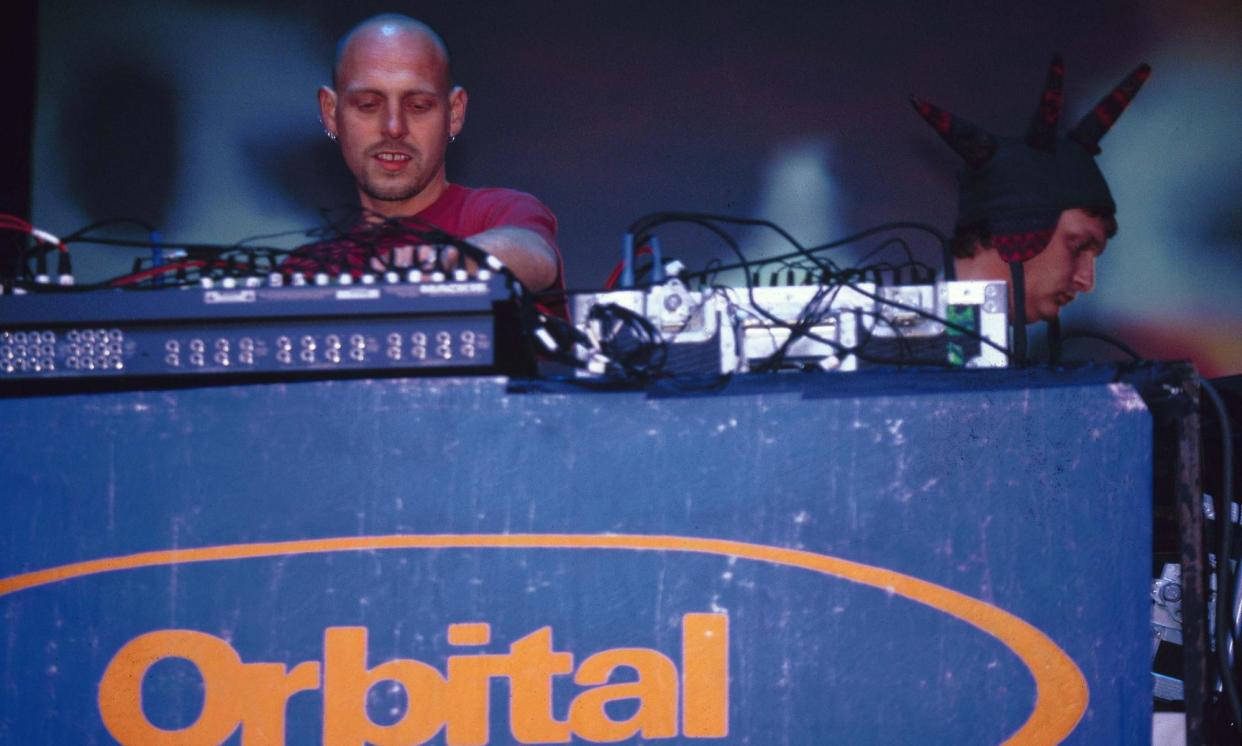‘We were the bridge between indie and dance’: Glastonbury icons Orbital on 30 years of breaking barriers

At today’s genre-bending Glastonbury, it’s hard to imagine hard lines ever being drawn between electronic and rock music. But 30 years ago, when Orbital played their first-ever Pyramid stage set, thereby inching the “indie kids” towards techno, it represented a landmark moment for the festival and for British music culture.
Brothers Phil and Paul Hartnoll were reflecting on how the festival has changed – and their own part in shifting it from a traditionally rockist event to the more accommodating one today – while in conversation with the Guardian’s chief pop music critic Alexis Petridis on Saturday morning.
Orbital got their start playing gigs in and around Sevenoaks in Kent, honing their show in the same way as their inspirations Kraftwerk, Cabaret Voltaire and New Order. “They were all doing it live ... How boring would it be to use a backing track?” said Paul. But at the time there was no established path for electronic musicians, and there was outward resistance to artists who sought to mix live.
In their commitment to being “rough, ready and raw”, Phil recalled having to push back against the expectation to use ear mics, and campaigning for a mini-studio to be set up on stage. From that emerged a club circuit and a network of electronic musicians, bringing them into rock venues and mainstream music culture.
“That was how a whole network built up around the country: DJs like us travelling around ... You just kind of linked up with people,” said Paul. “There hadn’t been a dance network beforehand. It was quite a magical time.”
They began making visuals for their shows, inspired by prog-rock acts such as Pink Floyd: “If we’re going to be on stage, we have to have something behind us.” They made their early videos by filming an oscilloscope, true to their DIY ethos and diverse sources. Their more political vocal samples reflected Paul’s love of anarcho-punk such as the Dead Kennedys and Flux of Pink Indians, and their dissatisfaction with the narrow view taken by much other electronic music.
“I used to listen to dance music, singing about love, and think ‘Why isn’t anyone singing about good stuff? I just thought it was missing from dance music. Obviously I didn’t really twig that people on ecstasy in a club don’t really want to hear it.” But it helped set Orbital apart, and eventually struck a chord with politically minded crowds such as Glastonbury’s.
Today, Phil said, they are embraced for their spirit of live experimentation, with songs emerging as a product of on-stage “happy mistakes” (and sometimes sad ones), and sets that give new shape to their recorded tracks. “We can make a track last an hour if we want.”
But even after initially finding success, being “the first dance music tour in rock venues”, Orbital weren’t easily accommodated, said Paul. The brothers recalled their “po-faced” appearance on Top of the Pops in 1990, when they were forced to dress up their debut single Chime for the sake of TV audiences. “It looked too fancy for us ... The BBC insisted that if you didn’t have a singer, you had to have a dancer,” said Paul. “They didn’t really know what to do with us.”
They made the best of it, he adds, downing some vodka oranges and jumping into the crowd to dance to Snap with the audience. “Top of the Pops died soon after that … We didn’t kill it, though.”
Their first appearance at Glastonbury drew the qualified endorsement of festival founder Michael Eavis, who praised Orbital for putting on a “really good show” – and playing “tolerable” music. “It was really a rock’n’roll festival – no dance music, anyway,” said Phil. Industry gatekeepers such as the indie kids at NME scorned electronic music as ‘boring’”. But he recalled audiences being faster to adapt: when Orbital followed Björk on what is now the Other stage, “everybody went mental”.
Now the brothers can see the part they played in breaking down those divides. “We were a little bit of a bridge between indie and electronic,” said Paul, joking that they pioneered a new genre: “prog-rave”.
“Hello, trailblazing or what?” added Phil.
They are still making music, said the brothers, pointing to their recent remix of Fontaines DC, and they expect to eventually release a new album. Paul said he is enjoying writing and his creativity more now than in his youth: “I have absolutely no idea what’s coming next – which is interesting.” But their 11th album, the follow-up to last year’s Optical Delusion, isn’t imminent, he added.
“We need to break up again,” joked Phil, referencing the brothers’ historically turbulent relationship. “Then get back together again when we need the money,” added Paul.
For now, they are celebrating 30 years since their landmark Glastonbury appearance, playing the Park stage tonight with a set full of “all the old faithfuls” (and a special guest, though they wouldn’t be drawn on who). The festival and its crowds may have transformed in recent decades, but Orbital haven’t. “It’s been 30 years, and we’re still ending on the same track!”

 Yahoo News
Yahoo News 
